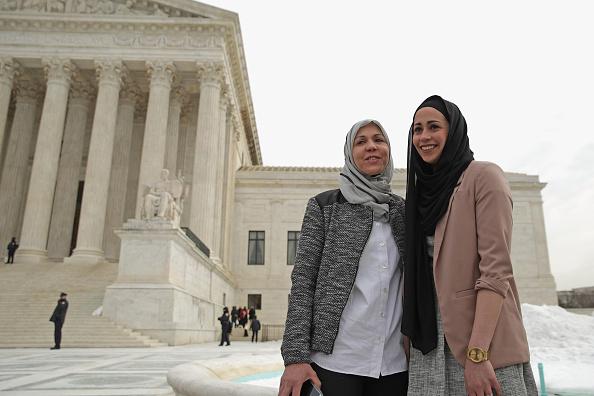The Supreme Court ruled 8-1 Monday against Abercrombie & Fitch in a religious discrimination case brought against the youth clothing retailer by the Equal Employment Opportunity Commission and a Muslim teenager whose job application was rejected by the company after she wore a headscarf to her interview. Justice Antonin Scalia wrote the majority decision.
Samantha Elauf was 17 when she applied to work at an Abercrombie store in Oklahoma in 2008. Per the established facts of her case, the company chose not to hire her because the headscarf she wore during her interview would violate its “Look Policy” employee dress code. While Elauf did not tell Abercrombie the headscarf was worn for religious reasons, the employee who conducted her interview inferred as much. Abercrombie’s subsequent legal position was that it had not discriminated against Elauf because she had not made a specific request for her headscarf to be accomodated and the company did not know for certain that her headscarf had religious meaning. SCOTUS ruled that an employer violates employment law when it makes a hiring decision that’s motivated by a desire not to accomodate a religious practice, regardless of whether the potential employee has explicitly requested accomodation and regardless of whether the employer knows for certain that the religious accomodation is needed. In Scalia’s words, even an “unsubstantiated suspicion” that a prospective employee would require religious accommodation is not a permissible reason not to hire them.
Clarence Thomas, in his dissent, wrote that a policy governing issues such as personal appearance cannot be said to constitute religious discrimination if it is applied equally to employees of all faiths.
The Court’s ruling reverses the decision of the Tenth Circuit in the case. Though Abercrombie has gone to court to defend its actions regarding Elauf and other headscarf-wearing Muslim plaintiffs, it does now officially allow employees to wear the items.
In 2005, Abercrombie paid $50 million to settle three suits alleging it discriminated against non-white employees in both hiring and employment practices.
Update, 1:30 p.m.: Abercrombie has released a statement on the ruling.
While the Supreme Court reversed the Tenth Circuit decision, it did not determine that A&F discriminated against Ms. Elauf. We will determine our next steps in the litigation, which the Supreme Court remanded for further consideration. A&F remains focused on ensuring the company has an open-minded and tolerant workplace environment for all current and future store associates. We have made significant enhancements to our store associate policies, including the replacement of the ‘look policy’ with a new dress code that allows associates to be more individualistic; changed our hiring practices to not consider attractiveness; and changed store associates’ titles from ‘Model’ to ‘Brand Representative’ to align with their new customer focus. This case relates to events occurring in 2008. A&F has a longstanding commitment to diversity and inclusion, and consistent with the law, has granted numerous religious accommodations when requested, including hijabs.
The company is correct that the Court did not decide Elauf’s lawsuit in her favor. It did, however, remand the case to the Tenth Circuit to make that determination under the Elauf-friendly interpretation of discrimination law described above.
